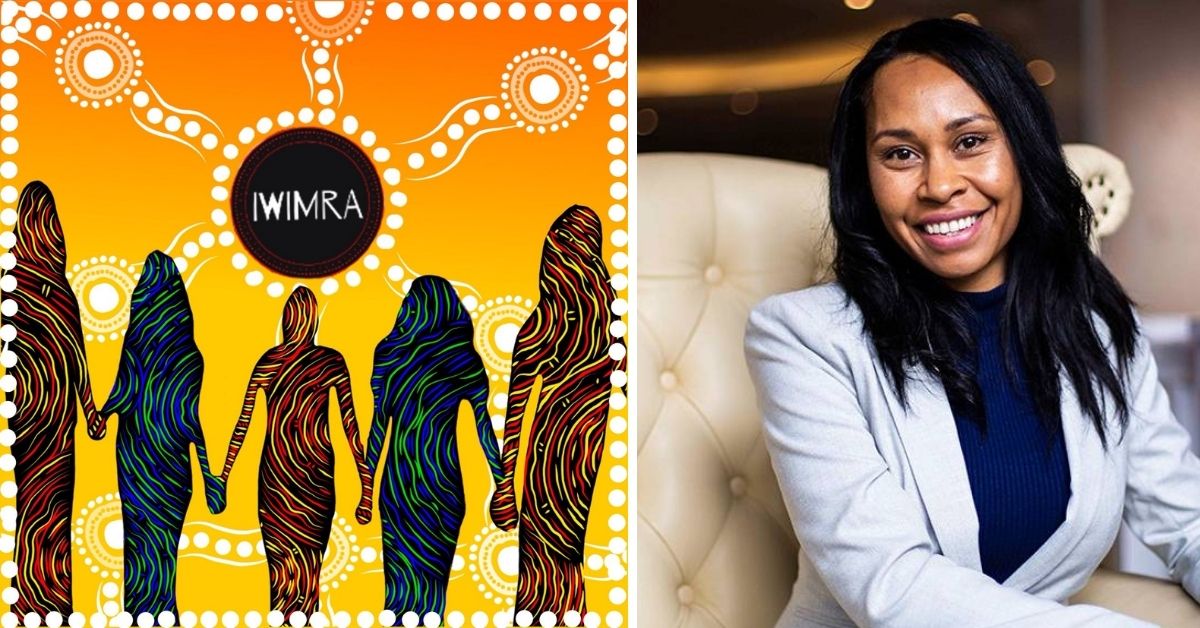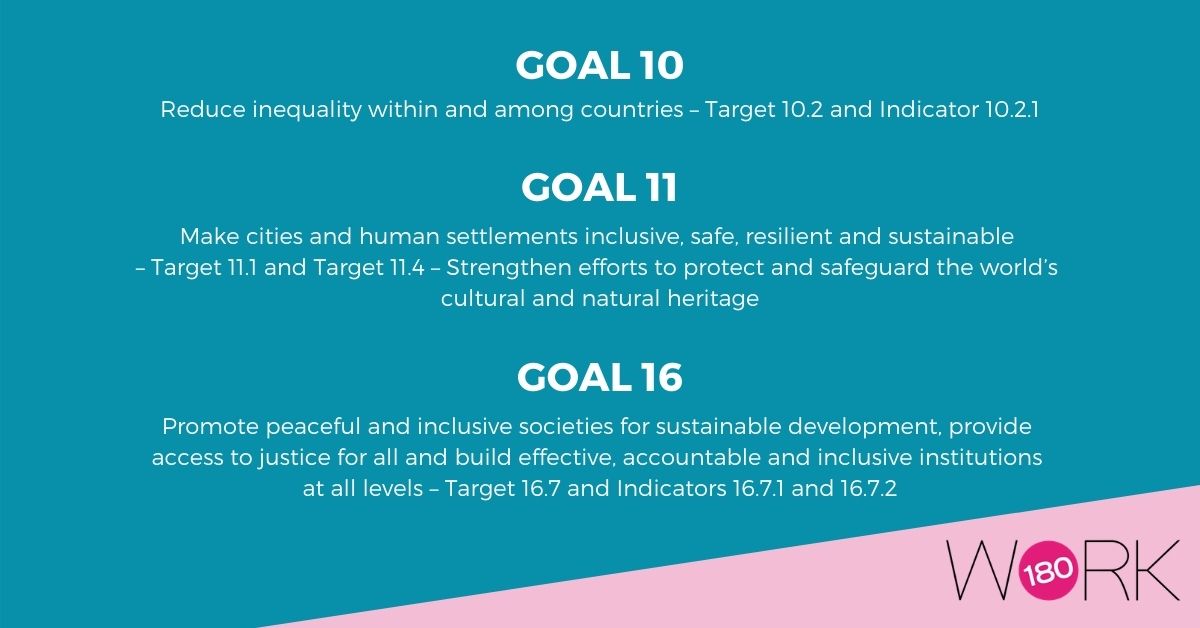To acknowledge NAIDOC week 2020, in collaboration with IWIMRA we developed a series of content to educate employers on how they can better understand and contribute to the success of the United Nations Sustainable Development Goals of 2030 relating to Indigenous Peoples. And importantly, we asked how organizations can truly acknowledge and celebrate First Nations Peoples.
“In understanding the overlays of the United Nations Sustainable Development Goals of 2030 and how it has a direct impact on the circumstances of Aboriginal and Torres Strait Islander peoples. It is now an opportunity to take ownership and recalibrate for our future.
This is now a call to action to embed practices that will consistently guide you in incrementing change. Education is key to co-creating our future.”
Florence Drummond, CEO of IWIMRA and Indigenous Retention Strategist

What are the most important steps for workplaces to consider to fulfil the UN Sustainable Development Goals relating to Indigenous Peoples?
Leah Cummins | Senior Technical Assistant Geoscience, Origin: The ongoing sharing of ideas, innovation and the support of initiatives that help build trust with Indigenous Peoples. The knowledge of Indigenous Peoples is an untapped resource and I firmly believe that if we are to achieve the UN Sustainable Development Goals at the workplace, we should not be afraid to support small ideas and projects that make an impact.
It becomes hard sometimes at a workplace or a corporate level to see what the end results will bring, but trust is the fundamental building block to listening to our Indigenous employees on small ideas that make huge impacts.
Adam Fletcher | Associate Director, Indigenous Banking, Portfolio Governance, NAB: Personally, Goal 10, Goal 11 and Goal 16 are the ones I’d focus on. Workplaces need to recognize they have an important role to play in addressing structural and historical issues that have disproportionately held Indigenous Peoples back in achieving the goals (even in some cases where the nation may be on track to meet them on aggregate).

Any workplace attempting to fulfil the UN SDGs should recognize that Indigenous Peoples have a unique perspective in relation to them. They should involve Indigenous colleagues in shaping the response to the UN SDGs and should invite external input from a diverse section of Indigenous Communities. All programs developed to address UN SDG should be independently reviewed for the impact on Indigenous Peoples.
For example, efforts to address poverty or employment gaps for Indigenous Peoples can have unintended consequences if they do not factor in Indigenous Peoples’ perspectives on employment. E.g. Full Employment for a community on homelands may look different to Full Employment for someone in a metropolitan city.
Loren Collyer | Student Advancement Officer, Executive Support Officer – Indigenous Engagement and Reconciliation, University of Newcastle: Employers should identify which goals best align with their business/organization and focus on these goals in a meaningful way rather than trying to tackle all the goals in a superficial way. Again, listening to and working with First Nations Peoples and communities from the very start in identifying the best pathways and actions to be taken in addressing these goals is crucial.

Ryan Novak | Consultant, Early Careers, NAB: Aligning key organisational commitments with the SDGs or the UNDRIP articles can meaningfully add to the nature of an organisation’s commitments. Understanding the intent of the UN’s Declaration on the Rights of Indigenous Peoples and the Sustainable Development Goals before the drafting process is important – and make sure that First Nations Peoples are leading and inputting into the conversation.
If not already in place, create a safe space for First Nations Colleagues to connect internally. This can be informal to begin with and completely optional. Allowing for a place for First Nations’ Colleagues to connect is a great start to ensuring their voice is heard and they can lead/inform decisions and initiatives relating to Indigenous Australians.
Long term goals look to ensure there is representation of Indigenous Australians at all levels of the business, from entry to executive to highlight pathways and development opportunities and input at all levels of decision making.
Tell us a moment in your workplace where you felt First Nations Peoples have been acknowledged or celebrated
Andrea Kean | Analytics Specialist, BHP: BHP sponsors the art event Tarnanthi Festival. Last year it was amazing, like nothing I’d ever been to. We saw some beautiful artwork from cultural groups around Australia and then a group from Arnhem land opened the festival in front of 3,000 people on the steps of the art gallery.
We’ve also signed and are part of the Voice of Treaty – the Uluru Statement from the Heart which is a big piece.
Leah Cummins | Senior Technical Assistant Geoscience, Origin: We recently did a welcome and acknowledgment to country video with some amazing staff that volunteered their time to film a short video. This video was shown at the company AGM this month, this is something never done before in the business. This small idea will make a huge impact across the workplace. I am so proud to have been part of something like this.

Rebecca Hyland | Reconciliation Action Plan Project Manager, Transport for NSW: A positive moment was the launch of Transport’s Reconciliation Action Plan (RAP) in August 2019. With the sheer size of our agency with circa 30,000 employees, combined with the fact that Transport has an impact on every person, every day in New South Wales, we have an incredible opportunity for reconciliation.
Our inaugural RAP brings together the great work that was already underway at Transport for many years, building on this foundation to launch an ambitious plan with over 64 deliverables. It has been wonderful to see how the organization has come together, collaborating on projects that impact Aboriginal employment and economic empowerment as well as acknowledging and celebrating our rich 65,000 year old culture.
Acknowledgement of Country is also standard procedure for every meeting – whether it is face to face or via video meetings.
One of the big events on the calendar each year is our NAIDOC Week cluster wide event and this year it’s on November 12. We have 250 employees attending and participating in a trivia event – to again increase cultural awareness and knowledge about Aboriginal culture – and also have some fun! Each of the Divisions also run NAIDOC Activities and staff are encouraged to join in their local community events.

Loren Collyer | Student Advancement Officer, Executive Support Officer – Indigenous Engagement and Reconciliation, University of Newcastle: Each year the university hosts the annual Alumni Excellence Awards and has created an Indigenous Alumni Award. This award recognizes alumni whose outstanding contribution has demonstrated engagement and impact working with Australian Aboriginal and/ or Torres Strait Islander communities. Publicly celebrating these high caliber graduates for their specific contributions to Indigenous communities really highlights the value that the university places not only on our Aboriginal and Torres Strait Islander students but on the important work that they undertake in our communities. It shows our university is proud of us and what we have achieved.
Thank you to all our contributors
We hope the valuable insights of our contributors help your organization fulfill the UN Sustainable Development Goals relating to Indigenous Peoples. As Florence Drummond says, such education is key to co-creating our future.
If you want to create a diverse and inclusive organization where everyone is welcome, take some inspiration from our Endorsed Employers.
For those who are unfamiliar, NAIDOC week stands for National Aborigines and Islanders Day Observance Committee. NAIDOC began in the 1920s and was expanded in 1974 to be a week of celebration for the First Nations Peoples. Each year a theme is chosen that highlights important issues and events. This year’s NAIDOC week theme is: ALWAYS WAS, ALWAYS BE.



